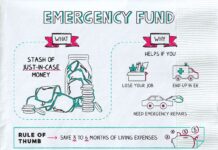Every year, there is news of another recession somewhere around the world. Even in the US, recessions are uncomfortably common, occurring every decade or so. If you want to be protected against the next recession to hit where you live, then you need to make some sound financial decisions. Here are some habits you can engage in each day to make sure that you won’t feel the next recession as hard.
Watch Your Spending
This is the first and best way to protect yourself. If you live simply and spend money sparingly, you won’t be as likely to get in over your head. You will be more likely to have some money tucked away and be able to bear the brunt of a recession easier than those who live week to week and are always using their credit cards to pay for major expenses.
Put Emergency Funds Away
Having an insured account means that even when a recession hits, your money will still be safe. You will have money that keeps its value even as the market goes down the drain. You’ll be able to draw on that emergency fund after a job loss, a pay cut or some kind of emergency and still be okay. How much should you save away? Financial experts from Lycos Asset Management advise that you have three months worth of expenses saved in case of an emergency. Not everyone can manage that, but no matter what you have saved away, any little bit will help.
Hire an Expert Asset Management Firm
If you have some assets that you could do something with, you want to be careful not to waste them or just let them sit unused. Hiring an asset management firm to manage your money and help you with your investments can enable you to build a nest egg. You can make your money grow and to give you something extra to work with in case a recession hits. You’ll want to be careful about who you hire, as you need to be sure that they can make good use of your money and give you advice that actually benefits you, but taking this step will set you apart from a lot of people who are simply not prepared for a recession to come their way.
Get a Second or Third Source of Income
Most people try to make do with a single course of income, but they often leave their talents unused and fail to capitalize on other potential income streams. If you have skills that you are not using in your regular job, you may be able to parlay those into a second or even a third job. These do not have to be full-time jobs, by any means, but having another way to earn money on the side gives you another career opportunity to jump into if your primary career goes under. When a recession hits, many people will lose their jobs or experience pay cuts, and you can give yourself a way to step to the side and into a new career if you already have something on the backburner.











